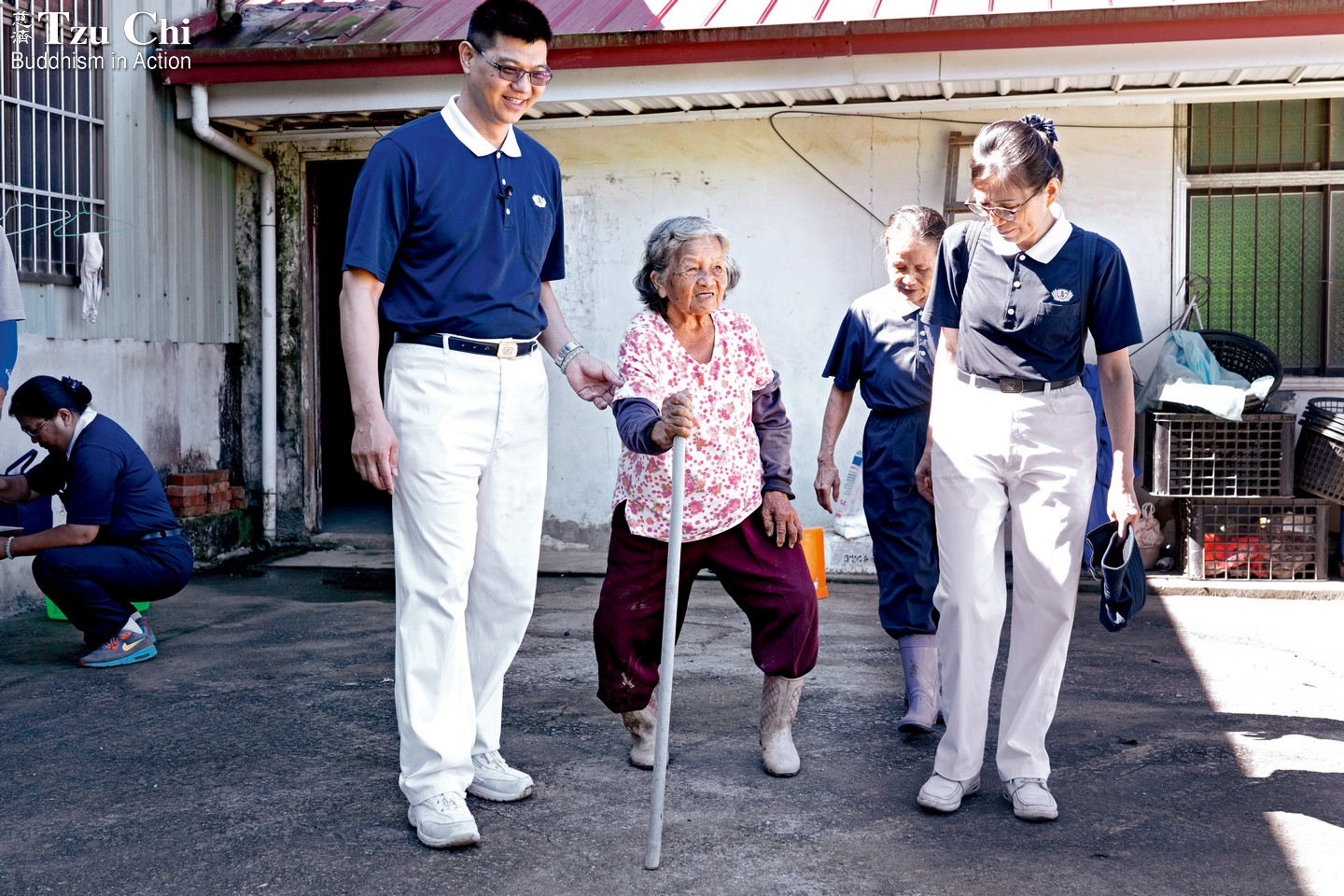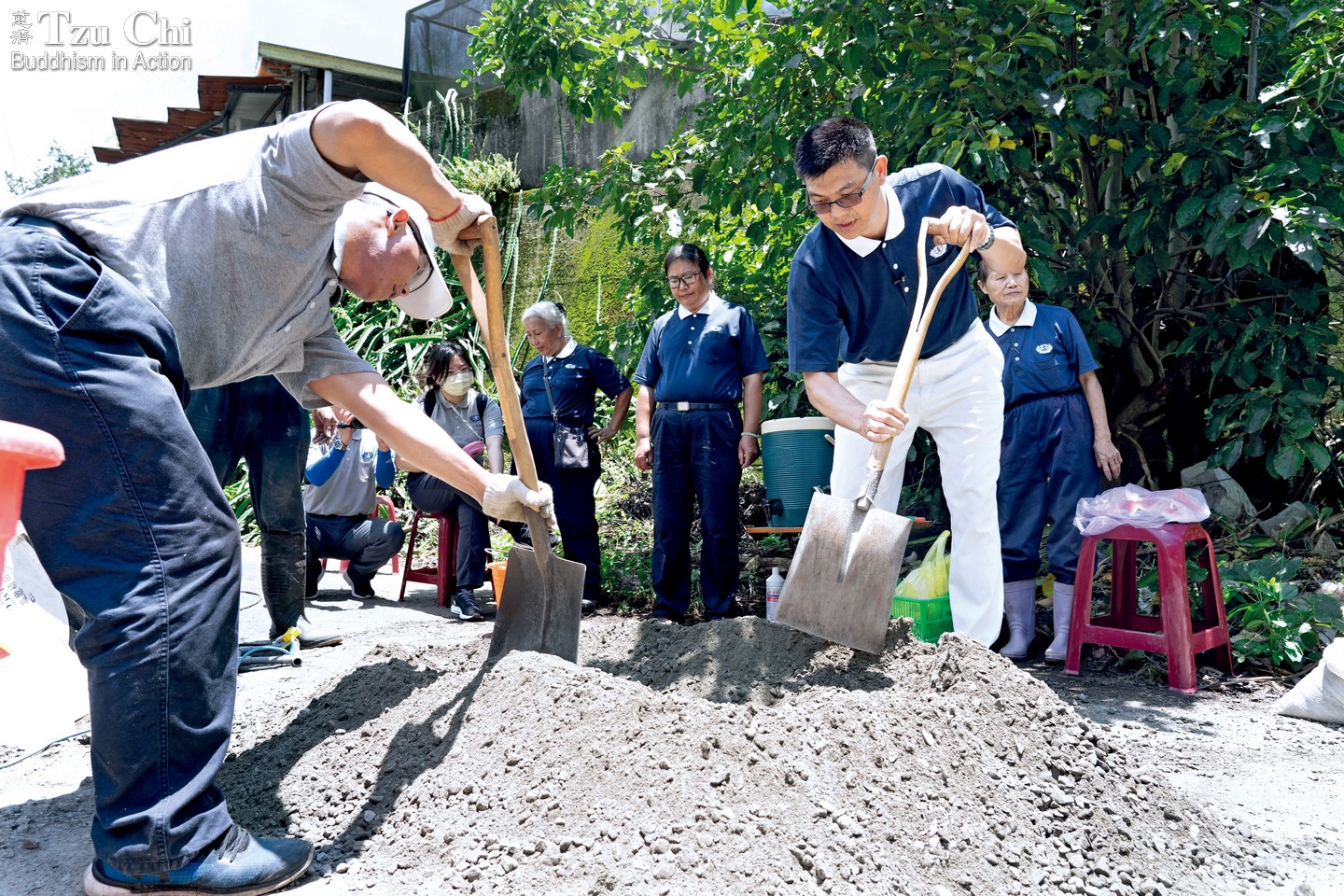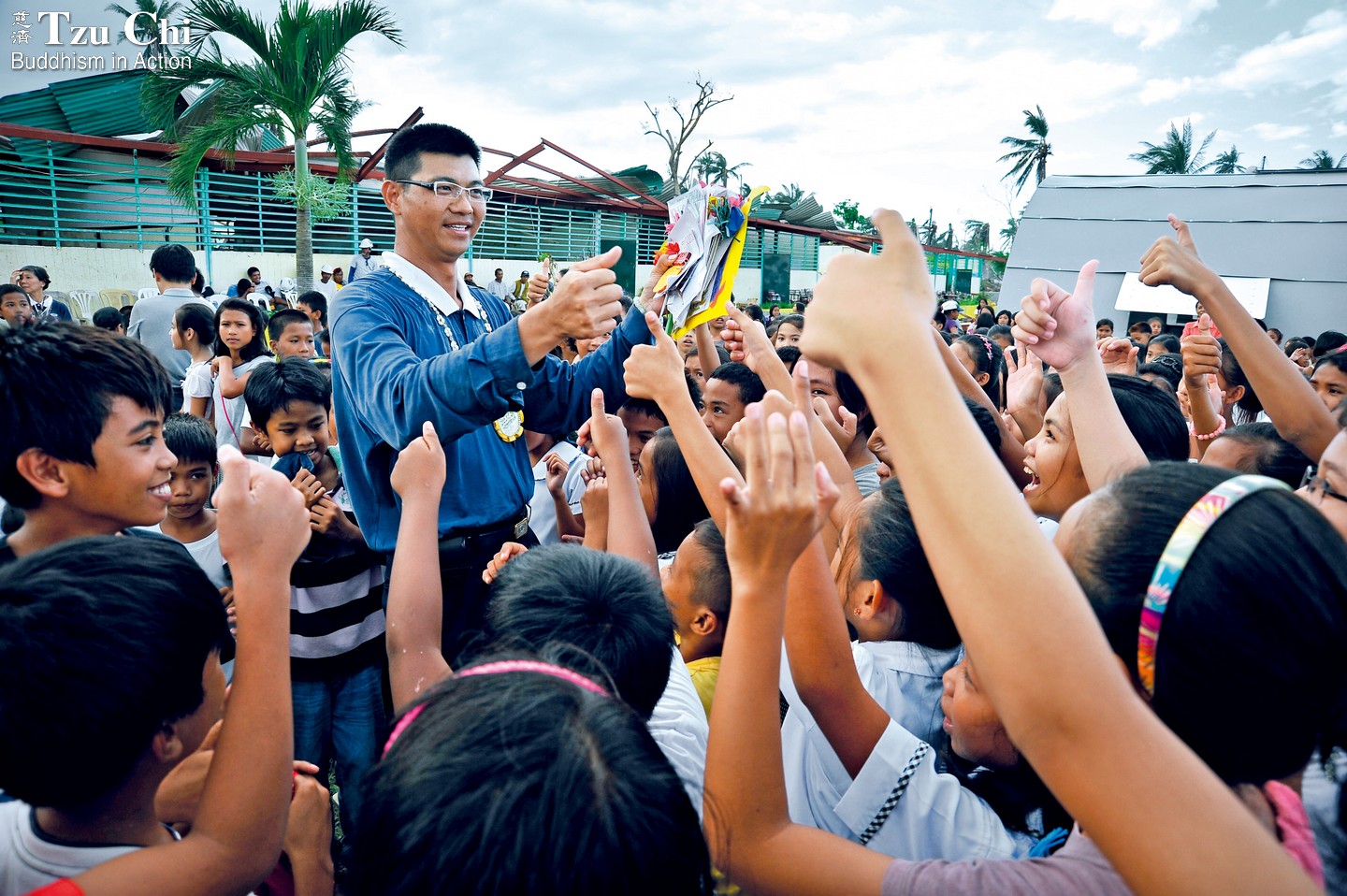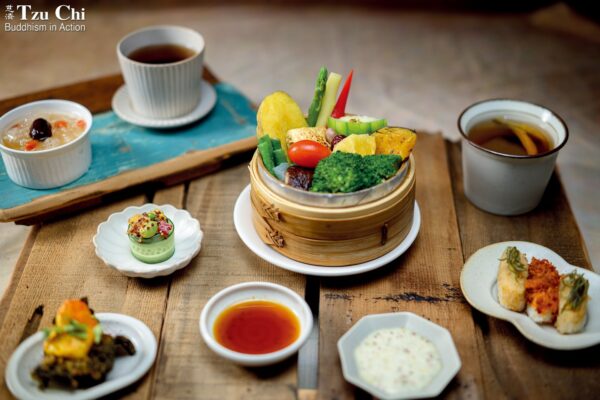By Ke Pei-yin
Edited and translated by Wu Hsiao-ting
Photos by Hsiao Yiu-hwa
Making money used to be his one and only goal in life, until a promise to the Buddha turned him in a new direction. Now giving of himself to the needy has become his lifelong commitment.
As soon as Xu, an elderly Tzu Chi care recipient, emerged from her house, Cai Ming-mo (蔡明模) greeted her in a spirited voice and stepped forward to give her a supporting hand. Cai and a few other volunteers had just arrived at Xu’s home to pay her a regular visit. They chatted a bit, then Cai asked her about a medical condition she had told them about on their last visit. It had been bothering her for some time. Cai explained they had asked a physician to come along this time to check on her.
Cai, 50, was the tallest among the volunteers. He also had the most sonorous voice of them all. But it’s not just his physical characteristics that set him apart—his personality also stands out in a crowd. Wherever he is, the atmosphere livens up, conversation flows easily, and laughter is constant. His gregarious nature can even chase away a dour expression on a care recipient’s face.
Cai might have inherited his friendly, outgoing personality from his father. Born in Changhua, central Taiwan, Cai is the youngest of five children. His family owned a factory that specialized in zinc alloy die casting. All was well until Cai’s oldest sister died in a car crash when he was in first grade. His mother was devastated, to the extent that she could no longer help her husband manage the factory. As a result, Cai’s father, kind and trusting by nature, generously made loans to his financially strapped relatives and friends. Before long, the family business began to experience cash-flow problems.
Cai’s father eventually had no choice but to close his factory and move the entire family to Taichung, also in central Taiwan. That was when Cai was a fifth grader. Though his family was in poor shape financially, Cai continued to lead a carefree life under the protective wings of his parents. Even so, he noticed something at the time that left a deep impression on him—the change in people’s attitudes towards his father when he fell on hard times. It was as if only wealth and status could win a person respect.
There was a big market for metal accessories for leather goods at the time, and Cai’s father soon made a comeback riding on that wave. But instead of learning from his experiences, he continued to make risky loans to others. By the time Cai was in ninth grade, his family was deep in debt again. To help with his family’s finances, Cai began working part-time at his father’s factory while going to school.
Cai completed his compulsory military service in the mid-1990s and emerged ready to start a career. At the time, many traditional manufacturing businesses in Taiwan were moving to China. Wanting to capitalize on the booming market for metal accessories abroad, Cai went to China too and set up a factory there. Taking to heart what had happened to his father, he buried himself in work, making money his one and only goal in life. When he was 30, he met the love of his life and tied the knot with her.
Finding happiness in volunteering
Cai was introduced to Tzu Chi through a friend. He began making monthly donations to Tzu Chi when he was 24, even though he didn’t know the charity foundation well. When he was 29, a massive earthquake hit central Taiwan, on September 21, 1999. As Cai delivered relief supplies on his own initiative to the disaster areas, he saw Tzu Chi volunteers there distributing hot meals to survivors. Only then did he realize that this was the organization to which he had been donating.
Every time Cai returned to Taiwan on breaks from running his business in China, he’d help his relatives who had become Tzu Chi volunteers do recycling work. He’d drive a truck to collect recyclables and help sort them out. He felt a rare peace while engaged in the unpaid volunteer work; his mind, usually churning with thoughts, would calm down. He especially enjoyed the times when, having finished their work for the day, he and his relatives would sit down for some tea and conversation. He had been living alone for years abroad, toiling away for his business. These moments of connection and conversation were very precious to him.
Some time later, his father had a run of bad luck. He was injured on one occasion and fell seriously ill on another. Cai hurried back to Taiwan both times. The second time, despite having no religious faith, he went to the Tzu Chi office on Minquan Road in Taichung and prayed to a statue of the Buddha there for blessings for his father. He’d rarely done that before, and he felt quite awkward prostrating himself before the statue.
Fortunately, his father regained consciousness three days later, and he was moved out of the intensive care unit a week after that. But the experience, and the promise Cai had made to the Buddha to take up charity work if his father recovered, prompted him to make a change. He decided to wrap up his business in China and return to Taiwan for good to better take care of his father and other family members.
Cai returned to Taiwan and started working at a factory owned by his brother-in-law. He began Tzu Chi volunteer training around the same time, splitting his time between volunteering and working at the factory. Thinking back on that time, he said that that year was his unhappiest. He felt lost having ended the business he had started in China. He felt he had nothing. But at the same time, he appreciated having embarked on the path of charity. It seemed that another door had opened in his life. After a relief trip to the Philippines in 2013, he even decided to quit his job and dedicate himself completely to volunteer work. He was just in his mid-40s at the time.

The walking stick that Xu (middle) used had rotted away at the bottom, but she couldn’t bear to throw it away because it had belonged to her late husband. Cai Ming-mo (left) decided to repair it for her after learning of its emotional value. Here, Xu uses a plastic tube that Cai had prepared to decide on the suitable length of the repaired stick.
Impermanence
In November 2013, Typhoon Haiyan hit the central Philippines, killing thousands of people and causing cataclysmic destruction. Leyte Province was one of the hardest hit areas. Tzu Chi decided to provide temporary classrooms for affected schools and temporary housing for families who had lost their homes. Cai and 12 other volunteers formed a construction team and traveled to disaster areas in Leyte to assist with the construction work and to pass on construction techniques to locals so they could help put up the structures.
“When I looked down at the Philippines from the airplane,” Cai recalled of his trip that time, “the more than 7,600 islands that made up the nation looked like pearls scattered on the sea. However, when I got nearer the airport apron, I discovered that not a single building was left intact.” He remembers walking on streets swamped with garbage and debris, and seeing corpses being pulled from under mud and rubble. An overwhelming sense of impermanence hit him. He reflected, “No matter how powerful or influential you are, there is no evading impermanence.”
Cai and his team members visited Tunga Central School, an elementary school in Tunga, northern Leyte, about half an hour from the airport. It was far enough from the sea to escape being devastated by the floods, but it had suffered damage just the same. Roofs had been blown off the school buildings, and students could only attend class when the weather was good.
“A little girl kept smiling at me from amidst a group of schoolchildren,” Cai remembers. Hand in hand with Cai, the girl guided him on a tour around the school. They couldn’t talk to each other due to the language barrier, but they both wore constant smiles. “This is my daughter,” Cai said to the interpreter, who later told him that the girl had been the only one in her family of nine to have survived the floods triggered by the typhoon.
A few days later, the team of volunteers went to Alangalang National High School, in Alangalang, northern Leyte, for more construction work. The roofs of the classrooms there had also been blown off, and their cement walls were dilapidated. At noon, Cai and the other volunteers had lunch with students at the school. They were surprised to see that the students’ lunch boxes contained nothing but plain rice—there was nothing at all to go with it. “And the rice was hard so that it would feel more filling,” remembered Cai.
The volunteers ending up sharing their lunches with the students and eating only rice themselves. Despite that, “it was the most delicious meal I’d ever had in my life,” Cai recalled.
Cai’s heart ached for the girl who had lost her entire family to the typhoon and for the students who had only rice to eat for their lunch. As his heart went out to them, he reflected on his attachments to money and status when he was younger. His vanity at the time was as plain as day. However, “People are very forgetful,” he said. He explained that it’s easy to count your blessings when you visit the needy and witness the hardships they are going through. But once you say goodbye to the needy and go back to your old life, that sense of contentment and gratitude can easily diminish. “Only when you’re constantly exposed to the world of the underprivileged and open your heart to feel their need will you truly experience a lasting difference in your heart,” he remarked.
Cai (right) and other volunteers mix sand and cement to build some steps for a care recipient.


Cai interacts with a group of children at Tunga Central School, where he helped put up some temporary classrooms after Typhoon Haiyan ravaged the central Philippines. Doing construction work under the hot sun was hard work, but seeing how happy the children were with their new classrooms made Cai forget all the hard work he had put in. HUANG XIAO-ZHE
Reining in his temper
After his relief trip to the Philippines, Cai talked to his wife, Zhou Hui-ping (周惠萍), about quitting his job and devoting himself entirely to volunteering for Tzu Chi. She was supportive. “Without my wife, I wouldn’t have been able to walk the Tzu Chi Path with such unwavering steps.” He thanks her for supporting every decision he has made. He is also grateful to have very thoughtful children. He often shares with them what he has experienced in his volunteer work, and they’ve grown closer to him because of it.
Cai recalled one day that he and his son, who was still in grade school at the time, decided to go swimming. But before they left, he received a message that a fellow Tzu Chi volunteer had taken ill. He asked his son if it would be okay if he visited that volunteer to extend his care before they went swimming. Instead of throwing a tantrum, his son readily agreed. Cai was touched by his young son’s consideration, and he reminded himself to do everything he could to be the best father he could be for his children. Even though his volunteer work keeps him busy, he makes a point of making breakfast for his children and taking them to and from school whenever he doesn’t have to attend to volunteer duties. He has decided to do so all throughout their junior and senior high school years.
Cai became a boss at 26 when he set up his own factory in China. Having experienced success at such a young age, he became prideful and often failed to consider other people’s feelings when he dealt with them. He remembers that shortly after he received his volunteer certification, he had a meeting with other volunteers to discuss a purchasing matter. During the meeting, his temper got the better of him and he lashed out impatiently at a senior volunteer: “We already went over this before and our decision was not to make that purchase. Why are you bringing it up again?!”
He was rueful when he recalled that incident, saying that his temper was short back then. It seemed that a fire of anger could be set ablaze in his heart at the slightest provocation. He realized afterwards that he had done wrong and let his temper get the best of him. He told himself to be sure to put a curb on his temper to avoid hurting others’ feelings.
He realizes that the Tzu Chi Path is not just a path of giving but also of spiritual cultivation, of constantly reflecting on and improving oneself. He will continue to polish his shortcomings away as he marches forward on the path he has chosen. He said that he has better understood life’s meaning in Tzu Chi and has found his purpose in life by serving others. He has realized that a simple life of giving is what he really wants. He is determined to continue working with other volunteers to relieve suffering, bring happiness to others, and make a difference in the world.



